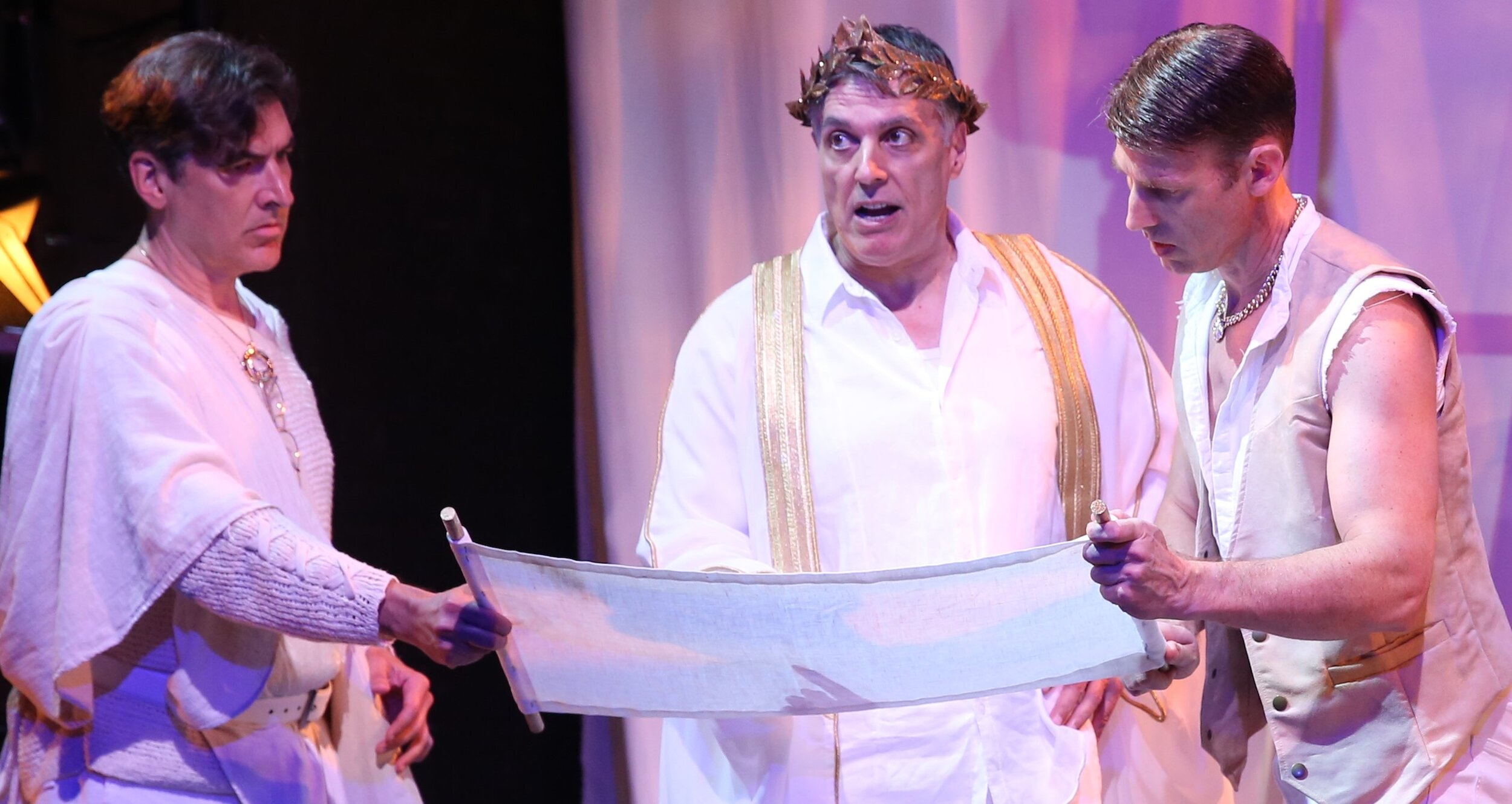Robert Cuccioli plays Julius Caesar and Teresa Avia Lim is Cleopatra in George Bernard Shaw’s Caesar and Cleopatra. Photographs by Carol Rosegg.
David Staller, the artistic director of the Gingold Group, has made the mission of his company to celebrate the plays of George Bernard Shaw. To that end, the group offers readings of Shaw plays monthly and hosts discussions about him, and each year presents a fully staged production. Last season it was the warhorse Heartbreak House, but the current offering, Caesar and Cleopatra, is a rarity.
Caesar with his secretary Britannus (Jonathan Hadley, left) and Rufio (Jeff Applegate), his right-hand man.
In a lengthy brochure Staller writes about changes he has made, because the five-act 1898 play was written to be read. His qualifications as a Shaw expert are formidable, but his mediation raises the question: how much is Shaw? In the standard Penguin text, GBS offered two prologue options: one is a long monologue by a character wearing a bird’s head; the other is a scene involving Roman soldiers, gambling and court gossip. Staller instead opens with Cleopatra’s chief nurse, Ftatateeta, addressing the audience and referring to Egyptian gods like Bastet and Hathor who aren’t in either of the published options. In a script note, he writes that it “was created by referencing Shaw’s original hand-written manuscript, his letters, production notes, early drafts for his 1945 screenplay [for the film that starred Vivien Leigh and Claude Rains] and his proposal for a newly conceived London production shortly before his death in 1950.” With so much heavy lifting, judging fidelity to Shaw is impossible.
For instance, according to the original text, Ftatateeta is “a huge grim woman, her face covered with tiny wrinkles … with the mouth of a bloodhound and the jaws of a bulldog.” But Brenda Braxton looks more like an Egyptian Jazzercise teacher. The upgrade derives from Shaw’s own attitude change to the character for a production just before he died.
Nonetheless, Staller has cast some fine actors in the key roles, which have been reduced. Teresa Avia Lim is a bumptious Cleopatra, young—the character is 16—and irreverent. Robert Cuccioli is the middle-aged Julius Caesar, world-weary and bemused by her. After a chance encounter at the Sphinx (Brian Prather sets the action at an Egyptian archaeological dig; Tracy Christensen’s costumes are a mix of present-day and period), the canny veteran takes her part against her brother Ptolemy (played by a puppet) and Ptolemy’s excitable regent, Pothinus (Rajeesh Bose).
Cleopatra struggles with the domination of her chief nurse, Ftatateeta (Brenda Braxton).
The lesser roles are solidly filled, particularly Apollodorus the Sicilian, played with comic brio by a heavily bangled Dan Domingues, who announces himself as “Apollodorus … the Si-CIL-ian!” A strapping Jeff Applegate as Rufio stands in for all Caesar’s military men, and Jonathan Hadley is the more mentally inclined secretary, Britannus.
For all the presumably canny changes, though, Caesar and Cleopatra feels like a dry run for Pygmalion (1913). Cuccioli’s wry, unflappable ruler tries to instill the qualities of a queen in the callow Cleopatra, and his remaking of her is akin to what Henry Higgins does with Eliza Doolittle. This time, though, the object is a genuine princess.
Shaw’s wit is well presented, too. With the Romans in Alexandria under attack, Rufio seeks Caesar’s instructions:
Caesar: Take every boat we have here…and seize the Pharos—that island with the lighthouse. …
Rufio: Are we to give up the city?
Caesar: We have not got it, Rufio! The palace we have; and—what is that building next door?
Rufio: The theatre.
Caesar: We will have that too. A theatre is always useful.
Cleopatra with her loyal subject Apollodorus the Sicilian (Dan Domingues).
There’s also a running joke about Caesar incorrectly pronouncing “Ftatateeta” that may seem innocuous comedy or, in a “woke” era, come off as imperialistic jingoism about foreigners’ names. More troubling, though, is Shaw’s attitude to the burning of the great library.
Pothinus: What is now burning is no less than the memory of mankind!
Caesar: A shameful memory. Let it burn.
Pothinus: Will you destroy the past?
Caesar: Yes, and build the future with its ruins.
But the main event is Cleopatra’s journey to ruler, and Lim finds all the juice in the part. She becomes a queen, but embraces her dark side to get there, to Caesar’s chagrin. She has what every Cleopatra must have: charisma.
The Gingold production fails to make the case that Caesar and Cleopatra is a masterpiece, but, working on a puny budget, Staller and his cast have done some sort of justice to this interesting, rarely staged work.
The Gingold Theatrical Group production of George Bernard Shaw’s Caesar and Cleopatra runs through Oct. 12 at the Lion Theatre Row (410 W. 42nd St.). Evening performances are at 7:30 p.m. Tuesday through Thursday and 8 p.m. Friday and Saturday; matinees are at 2 p.m. Saturday and 3 p.m. Sunday. For ticket and information, call (212) 239-6200, or visit the box office or gingoldgroup.org.






